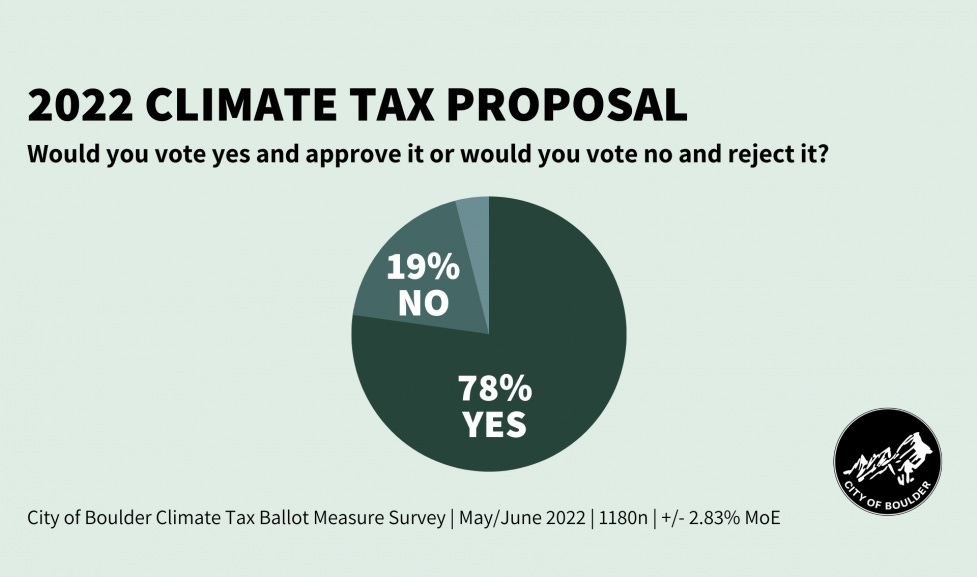Boulder's Attempt to Change to a Muni
Figure 1. Boulder's support for a CO2 tax. 58% of the respondents said they were ``extremely worried" about global warming; 20% are only ``very worried". The tax they assessed themselves is consistent with a social cost of carbon of less than $10/ton CO2.
The Gordian Knot News recently proposed a coop based grid. Uppity choir members have pointed out that less than 13% of American ratepayers are coop members. They want a plan for transitioning the other 87% who are almost all city dwellers. I will use Boulder, Colorado as an example. Boulder is a town where driving a hybrid instead of a Tesla is equivalent to wearing a Maga cap elsewhere. Groups in Boulder have waged a decade long campaign to secede from the area's investor owned utility and set up their own muni. Recently, after spending over 20 million dollars, they suspended the effort with the utility still in control. Here's how they should have done it.
Boulder's failed attempt to switch to a city owned electricity utility was not driven by economics or reliability or resilience. Colorado utilities operate under the regulated monopoly model under which the utilities have an incentive to overbuild capacity. The attempt was motivated by a desire to have more of Boulder's electricity produced by wind/solar than Xcel, the area's investor owned utility, was willing to build. For the people behind the effort, more wind/solar has become the goal and more fossil is anathema. But fossil is essential to establishing the independence required in order to be able to control the CO2 emissions produced by the electricity that Boulder consumes.
The Coop Transition Plan involves 4 steps:
1. Form a muni. In most states, this will require some sort of permission from the PUC.
2. Build back up system. In Boulder's case, to provide 2 kilowatts per person will require about $200 million dollars of Open Cycle Gas Turbines. For the 100,000 person city, that's about $2000 per head, or $130 per head annually, assuming 30 year life and a real discount rate of 5%. For comparison, Boulder has enacted a carbon tax which collects about five million annually, or $50/head.1 That money then more or less disappears.
3. Purchase Xcel's in town distribution system, using condemnation if necessary. Since the city's contract with Xcel has a 20 year life, when that contract is up for renewal, the city holds all the cards provided it can generate its own power.
4. Spin off the muni to a single purpose coop.
The coop is now in control. It can contract with whomever for power. Since it does not need to buy power, it will have the upper hand in these negotiations. My advice would be to buy wind/solar power as long as the price is less than the variable cost (mainly fuel) of using its own generators. The fuel cost should include the social cost of CO2, which the town puts at less than 0.5 cents/kWh. And have those turbines ready to go.
This is a very strange tax. Residents are charged 0.0049 $/kWh; commercial entities are charged 0.0009 $/kWh; and industry is charged 0.0003 $/kWh. Apparently, industrial CO2 has one-tenth the global warming effect of residential. With natural gas at 500 gCO2/kWh, the imputed social cost of carbon is about $10/ton CO2 for residents, and less than $1/ton for industries.



I appreciate these short posts in which you summarize or illustrate concepts covered at length in previous offerings. Very helpful.